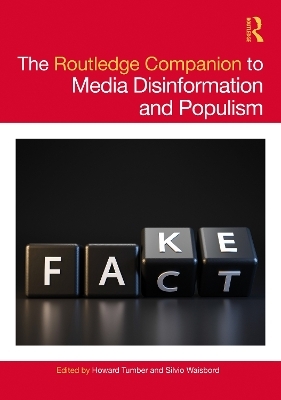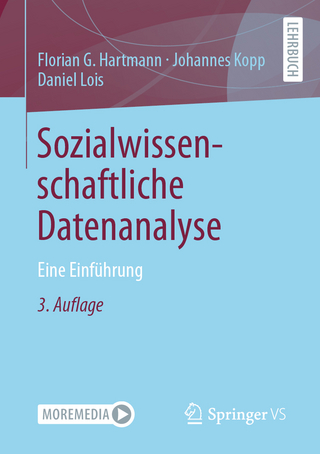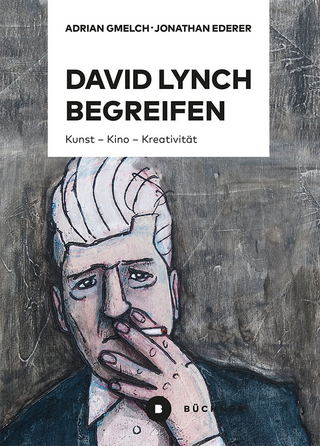
The Routledge Companion to Media Disinformation and Populism
Routledge (Verlag)
978-0-367-70491-9 (ISBN)
The Routledge Companion to Media Disinformation and Populism explores how recent transformations in the architecture of public communication and particular attributes of the digital media ecology are conducive to the kind of polarised, anti-rational, post-fact, post-truth communication championed by populism. It is both interdisciplinary and multidisciplinary, consisting of contributions from both leading and emerging scholars analysing aspects of misinformation, disinformation, and populism across countries, political systems, and media systems. A global, comparative approach to the study of misinformation and populism is important in identifying common elements and characteristics, and these individual chapters cover a wide range of topics and themes, including fake news, mediatisation, propaganda, alternative media, immigration, science, and law-making, to name a few.
This companion is a key resource for academics, researchers, and policymakers as well as undergraduate and postgraduate students in the fields of political communication, journalism, law, sociology, cultural studies, international politics and international relations.
Howard Tumber is Professor in the Department of Journalism at City, University of London, UK. He is a founder and editor of Journalism: Theory, Practice and Criticism. He has published widely on the sociology of media and journalism. Silvio Waisbord is Director of and Professor in the School of Media and Public Affairs at George Washington University, USA. He was the editor-in-chief of the Journal of Communication, and he has published widely about news, politics, and social change.
Introduction
1. Media Dis/Misinformation and Populism
Part 1 KEY CONCEPTS 2. What do we mean by populism?
3. Misinformation and Disinformation
4. Rethinking Mediatisation: Populism and the Mediatisation of Politics
5. Media Systems and Misinformation
6. Rewired Propaganda: Propaganda, Misinformation, and Populism in the Digital Age
7. Hate propaganda
8. Filter bubbles and digital echo chambers
9. Disputes over or against reality? Fine-graining the textures of post-truth politics
10. Fake News
PART 2 MEDIA MISINFORMATION AND DISINFORMATION
11. The Evolution of Computational Propaganda: Theories, Debates, and Innovation of the Russian Model
12. Polarisation and Misinformation
13. Data Journalism and Misinformation
14. Media and the "Alt-Right"
15. ‘Listen to your gut’: How Fox News’ Populist Style Changed the American Public Sphere and Journalistic Truth in the Process
16. Alternative media: challenging or exacerbating populism and mis/disinformation?
17. Online harassment of journalists as a consequence of populism, mis/disinformation, and impunity
18. Lessons from an extraordinary year: Four heuristics for studying mediated misinformation in 2020 and beyond
19. Right-wing Populism, Visual Disinformation, and Brexit: From the UKIP ‘Breaking Point’ poster to the aftermath of the London Westminster Bridge Attack
Part 3 THE POLITICS OF MISINFORMATION AND DISINFORMATION
20. Misogyny and the politics of misinformation
21. Anti-immigration disinformation
22. Science and the politics of misinformation
23. Government Disinformation in war and conflict
24. Military Disinformation: A bodyguard of lies
25. Extreme right and mis/disinformation
26. Information disorder practices in/by contemporary Russia
27. Protest, Activism, and False Information
28. Conspiracy theories: Misinformed publics or wittingly believing "false" information?
29. Corrupted Infrastructures of Meaning: Post-truth Identities Online
30. Consumption of Misinformation and Disinformation
PART 4 MEDIA AND POPULISM
31. Populism in Africa: Personalistic Leaders and the Illusion of Representation
32. Populism and misinformation from the American Revolution to the 21st-century United States
33. Populism, Media, and Misinformation in Latin America
34. Perceived Mis- and Disinformation in a Post-Factual Information Setting: A Conceptualization and Evidence from ten European Countries
35. The Role of Social Media in the Rise of Right-Wing Populism in Finland
36. Social Media Manipulation in Turkey: Actors, Tactics, Targets
37. Populist rhetoric and media misinformation in the 2016 UK Brexit referendum
38. Media policy failures and the emergence of right-wing populism
39. Disentangling Polarization and Civic Empowerment in the Digital Age: The Role of Filter Bubbles and Echo Chambers in the Rise of Populism
Part 5 RESPONSES TO MISINFORMATION, DISINFORMATION AND POPULISM
40. Legal and regulatory responses to misinformation and populism
41. Global responses to misinformation and populism
42. Singapore’s fake news law: Countering populists’ falsehoods and truth-making
43. Debunking Misinformation
44. News Literacy and Misinformation
45. Media and Information Literacies as a Response to Misinformation and Populism
46. People-Powered Correction: Fixing Misinformation on Social Media
47. Countering Hate speech
48. Constructing digital counter-narratives as a response to disinformation and populism
49. Journalistic responses to misinformation
50. Responses to Mis/Disinformation: Practitioner Experiences and Approaches in Resource Poor Settings
51. The Effect of Corrections and Corrected Misinformation
52. Building Connective Democracy: Interdisciplinary Solutions to the Problem of Polarisation
| Erscheinungsdatum | 18.04.2024 |
|---|---|
| Reihe/Serie | Routledge Media and Cultural Studies Companions |
| Zusatzinfo | 7 Tables, black and white; 5 Line drawings, black and white; 3 Halftones, black and white; 8 Illustrations, black and white |
| Verlagsort | London |
| Sprache | englisch |
| Maße | 174 x 246 mm |
| Gewicht | 1043 g |
| Themenwelt | Sozialwissenschaften ► Kommunikation / Medien ► Medienwissenschaft |
| ISBN-10 | 0-367-70491-9 / 0367704919 |
| ISBN-13 | 978-0-367-70491-9 / 9780367704919 |
| Zustand | Neuware |
| Informationen gemäß Produktsicherheitsverordnung (GPSR) | |
| Haben Sie eine Frage zum Produkt? |
aus dem Bereich


